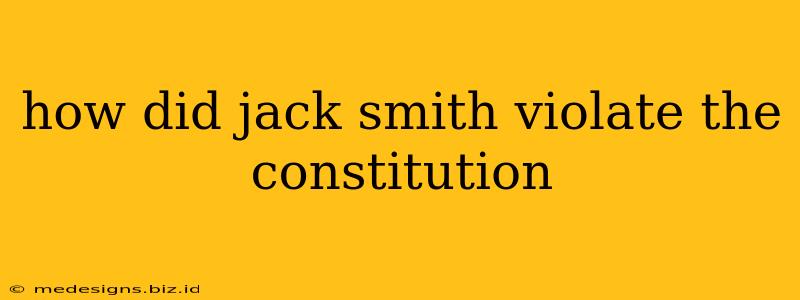The recent indictments brought by Special Counsel Jack Smith against Donald Trump have sparked intense debate and accusations of constitutional violations. While Smith's actions are under intense scrutiny, it's crucial to examine these claims with nuance and evidence-based analysis, avoiding sensationalism and partisan rhetoric. This post aims to dissect the most prominent allegations leveled against Smith, exploring their legal basis and the counterarguments.
Understanding the Allegations:
The accusations against Jack Smith generally fall into these categories:
-
Violation of the Due Process Clause: Critics argue Smith's investigations and indictments have infringed upon Trump's right to due process, citing concerns about prosecutorial overreach and the timing of the charges. These arguments often center on the perception that the investigations were politically motivated and designed to damage Trump's reputation.
-
Abuse of Power: The broader claim of abuse of power suggests Smith exceeded his authority as Special Counsel, employing tactics deemed inappropriate or exceeding the scope of his mandate. The appointment of a Special Counsel itself is sometimes questioned, with some arguing it was a politically motivated move.
-
Lack of Transparency and Fairness: Complaints of a lack of transparency revolve around the investigative process, with critics alleging insufficient disclosure of evidence and biased handling of information. The fairness of the process is often questioned, focusing on potential conflicts of interest or undue influence on witnesses.
Analyzing the Arguments Against the Allegations:
It's important to note that no court has yet ruled that Jack Smith violated the Constitution. The arguments against the allegations often center on these points:
-
Legitimate Investigative Authority: Supporters of Smith's actions highlight that he was appointed under established legal procedures and operated within his assigned mandate. The investigations, they argue, were warranted by credible evidence of potential wrongdoing.
-
Presumption of Innocence: While the allegations are serious, it is crucial to remember that Trump maintains a presumption of innocence until proven guilty beyond a reasonable doubt. Criticism of the Special Counsel should not be conflated with a conclusion of guilt or constitutional violations.
-
Judicial Oversight: The judicial system provides checks and balances on prosecutorial actions. Any potential constitutional violations would be subject to judicial review and potential legal challenges. The courts will ultimately determine the legality of the processes employed.
The Importance of Context and Evidence:
Assessing the validity of the allegations requires careful consideration of the specific evidence presented in each case. Generic claims of constitutional violations lack substance without concrete examples and supporting evidence. A thorough examination of court filings, witness testimonies, and the investigative process is necessary before reaching any conclusions.
Conclusion: The Ongoing Debate
The accusations against Jack Smith highlight a crucial aspect of the American justice system: the balance between vigorous investigation and the protection of constitutional rights. While robust scrutiny of prosecutorial actions is vital for ensuring accountability and preserving democratic values, accusations must be supported by credible evidence and subjected to judicial review. The ongoing debate surrounding Smith's conduct underscores the complexity and importance of maintaining a fair and impartial justice system, even amidst intense political polarization. The ultimate determination of whether constitutional violations occurred rests with the courts.
